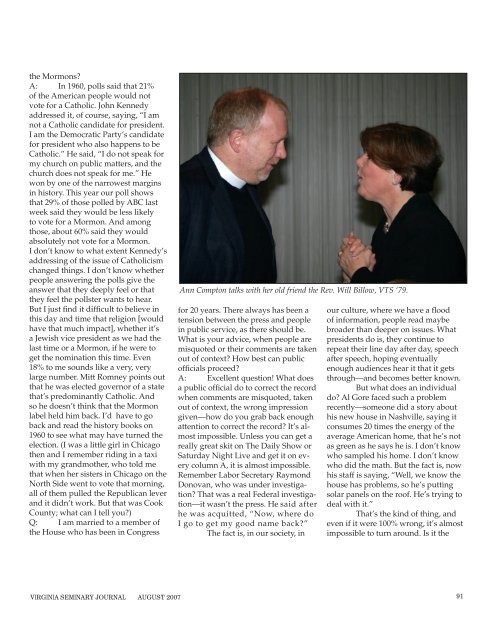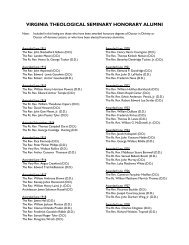Seminary Journal 2008 (August) - Virginia Theological Seminary
Seminary Journal 2008 (August) - Virginia Theological Seminary
Seminary Journal 2008 (August) - Virginia Theological Seminary
Create successful ePaper yourself
Turn your PDF publications into a flip-book with our unique Google optimized e-Paper software.
the Mormons?<br />
A: In 1960, polls said that 21%<br />
of the American people would not<br />
vote for a Catholic. John Kennedy<br />
addressed it, of course, saying, “I am<br />
not a Catholic candidate for president.<br />
I am the Democratic Party’s candidate<br />
for president who also happens to be<br />
Catholic.” He said, “I do not speak for<br />
my church on public matters, and the<br />
church does not speak for me.” He<br />
won by one of the narrowest margins<br />
in history. This year our poll shows<br />
that 29% of those polled by ABC last<br />
week said they would be less likely<br />
to vote for a Mormon. And among<br />
those, about 60% said they would<br />
absolutely not vote for a Mormon.<br />
I don’t know to what extent Kennedy’s<br />
addressing of the issue of Catholicism<br />
changed things. I don’t know whether<br />
people answering the polls give the<br />
answer that they deeply feel or that<br />
they feel the pollster wants to hear.<br />
But I just fi nd it diffi cult to believe in<br />
this day and time that religion [would<br />
have that much impact], whether it’s<br />
a Jewish vice president as we had the<br />
last time or a Mormon, if he were to<br />
get the nomination this time. Even<br />
18% to me sounds like a very, very<br />
large number. Mitt Romney points out<br />
that he was elected governor of a state<br />
that’s predominantly Catholic. And<br />
so he doesn’t think that the Mormon<br />
label held him back. I’d have to go<br />
back and read the history books on<br />
1960 to see what may have turned the<br />
election. (I was a little girl in Chicago<br />
then and I remember riding in a taxi<br />
with my grandmother, who told me<br />
that when her sisters in Chicago on the<br />
North Side went to vote that morning,<br />
all of them pulled the Republican lever<br />
and it didn’t work. But that was Cook<br />
County; what can I tell you?)<br />
Q: I am married to a member of<br />
the House who has been in Congress<br />
VIRGINIA SEMINARY JOURNAL AUGUST 2007<br />
Ann Compton talks with her old friend the Rev. Will Billow, VTS ‘79.<br />
for 20 years. There always has been a<br />
tension between the press and people<br />
in public service, as there should be.<br />
What is your advice, when people are<br />
misquoted or their comments are taken<br />
out of context? How best can public<br />
offi cials proceed?<br />
A: Excellent question! What does<br />
a public offi cial do to correct the record<br />
when comments are misquoted, taken<br />
out of context, the wrong impression<br />
given—how do you grab back enough<br />
attention to correct the record? It’s almost<br />
impossible. Unless you can get a<br />
really great skit on The Daily Show or<br />
Saturday Night Live and get it on every<br />
column A, it is almost impossible.<br />
Remember Labor Secretary Raymond<br />
Donovan, who was under investigation?<br />
That was a real Federal investigation—it<br />
wasn’t the press. He said after<br />
he was acquitted, “Now, where do<br />
I go to get my good name back?”<br />
The fact is, in our society, in<br />
our culture, where we have a fl ood<br />
of information, people read maybe<br />
broader than deeper on issues. What<br />
presidents do is, they continue to<br />
repeat their line day after day, speech<br />
after speech, hoping eventually<br />
enough audiences hear it that it gets<br />
through—and becomes better known.<br />
But what does an individual<br />
do? Al Gore faced such a problem<br />
recently—someone did a story about<br />
his new house in Nashville, saying it<br />
consumes 20 times the energy of the<br />
average American home, that he’s not<br />
as green as he says he is. I don’t know<br />
who sampled his home. I don’t know<br />
who did the math. But the fact is, now<br />
his staff is saying, “Well, we know the<br />
house has problems, so he’s putting<br />
solar panels on the roof. He’s trying to<br />
deal with it.”<br />
That’s the kind of thing, and<br />
even if it were 100% wrong, it’s almost<br />
impossible to turn around. Is it the<br />
91



